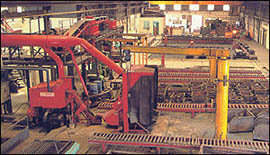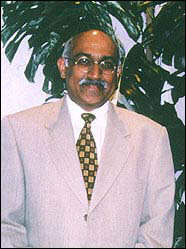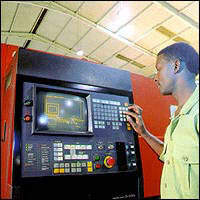 AN INDUSTRIAL NATION BY THE YEAR 2020 INDUSTRY AN INDUSTRIAL NATION BY THE YEAR 2020 INDUSTRY |
Even though the manufacturing sector still accounts for 10% of GDP, President Moi and his government are resolved to transform Kenya's economy into an industrial one by the year 2020, a 20/20 vision, one might say. For years the government policy was import substitution, until in the 1980's it shifted to export promotion. In 1992, under international pressure, the liberalization of trade was imposed, thus opening the gates to all kinds of imports. At the onset this hurt local businesses, that saw their market share yielding to better and cheaper imported goods. Nevertheless, in the past few years, the industrial sector has made a dramatic effort to become more competitive by increasing efficiency, improving quality and cutting down costs. Despite these efforts, the manufacturing sector has been badly hurt by skyrocketing interest rates and an ever-feeble Stock Exchange. This has prevented them from borrowing in order to expand at the necessary pace. Notwithstanding, there is a group of valiant entrepreneurs who have fought against all odds in order not only to survive, but to expand and export.
 EAST AFRICAN FOUNDRY WORKS, THE WORKINGS OF A FOUNDRY EAST AFRICAN FOUNDRY WORKS, THE WORKINGS OF A FOUNDRY |

An excellent example of this new batch of successful businessmen is the Sagoo family. Like most industrialist, they are third generation Kenyans from Indian ancestry. The British brought Indian workers to construct the Mombasa-Uganda railway in the 1880's. After its completion many of them stayed in the country, forming what today is the industrial mesh. The patriarch of the family founded East African Foundry Works back in 1972 with only 150 dollars. Today the group's turnover is US$ 7 million. This family company has been growing 15% yearly since its inception. The reason?: they found the right niche. Before their existence there were no steel casting facilities in East Africa, having to be imported from overseas. Again, the reason for their existence was import substitution. They started producing conventional machines for the metal and woodworking industries, sanding machines, special purpose machines, etc. They noticed that Europe progressively switched to computerized machines, halting the production of traditional ones. Most Africans are not trained to use such sophisticated machinery. Furthermore, due to constant power cuts and fluctuations experienced in most of the African continent, high-tech European machines do not last. Thus, they found themselves producing and casting machines for which they already had a market in East, Central and South Africa. They were ready to take the plunge into neighboring countries. Nowadays 50% of their turnover goes to bordering countries (Uganda, Tanzania, Kenya, Zambia, Rwanda and Malawi). They are also quite well consolidated in South Africa.
In 1990 they incorporated a new company to the Group: Alloy Steel Castings. Later, in 1998 they started a paper conversion plant (CEMPACK), vertically integrating their company. In the area of quality improvement they were the first firm to obtain the ISO-9002 Certificate of Quality in Kenya. This was the last step needed to tackle the developed markets. Mr. Jaspal Sagoo, Director of the Group, is proud of their first entry to Europe through the Hanover Fair in Germany, where they received an excellent response. So far they have only tried to supply the bigger castings for sophisticated machinery built in Europe. "In fact, that is what Europe and the USA really need right now, because foundries are dying industries in both places, and the cost of production there is just outrageous", explains Mr. Sagoo. "Europe is extremely quality conscious, which makes it a very difficult market to penetrate. America has been much more receptive towards us in trying to get a finished product".
 POWER TECHNICS, HIGH TECHNOLOGY IN THE BUSH POWER TECHNICS, HIGH TECHNOLOGY IN THE BUSH |

As a matter of fact, European and American companies
have started to look at local companies to license
the manufacturing of their products in the region.
Africa is starting to be looked at as the market
of the next millenium. The perfect example of this
North-South cooperation is Power
Technics. This young company has grown to be
one of the most efficient and high-tech oriented
companies in Africa. When it started in 1982 with
only US$ 500 their only drive was their ambition.
From their original production of small motor control
panels for pumps, cold rooms, etc, they have expanded
their range of products to electrical power distribution
switchboards and lighting fixtures. In just 8 years
they have become leaders of the market, controlling
more than 60% of the lighting business in the East
African region. "We have created an image in
the market and the image is actually bringing the
returns on business", says Mr.
Naresh Mehta, the worldly Managing Director
of the company. "We strive towards a situation
where we want to be at par with our technology with
that of Europe or any other country". As a
matter of fact, European firms such as Thorn Lighting
or Schneider Electric have just found that the quality
of production matches their own and have thus established
strategic alliances with Power Technics to distribute
or manufacture their products under license. Mr.
Mehta points out that their partners have grown
in the region with them, "it is uneconomical
for these companies to set up similar operations
here and invest so much in machinery when we are
already doing the same product. So if we grow, they
automatically grow with us". |

Now they are concentrating in uninterrupted power supply (UPS). When computer information technology started to grow, the need for machines that would keep a constant flow of electricity was essential for the computers to working properly, hence Power Technics also ventured into this field. Again, they have become leaders in this particular area. "We want to be number one on anything we get involved in, or we do not want to get into it". Despite the economic recession it is this strive that makes companies such Power Technics to continue growing and innovating. Foreign companies looking for new markets have discovered that it is far easier to establish a partnership with a local company that has the right technology and which knows the market rather than trying to penetrate this intricate market on their own.
 DOSHI GROUP OF COMPANIES: BUILDING AHEAD DOSHI GROUP OF COMPANIES: BUILDING AHEAD |
Despite the interest in establishing business links and joint ventures with foreign companies, Mr. Ajay Doshi, Director of the Doshi Group of Companies affirms that they want to keep their own identity and their own way of working. This is a recurrent thought expressed by many Kenyan companies. Numerous Kenyan industries have been struggling for years to obtain a niche in the market. Their work force is extremely loyal, strikes are unheard of, and labor unions are relatively weak, since most employers tend to be very protective with their employees.
A family owned group, Doshi started in the timber business and progressively integrated new lines of activities related to the construction business: metal construction materials, pipes and sections, electrical cables, etc. Today they are among the top manufacturers of these products in Kenya. As most local companies, they view the East African Community (83 million people) as their natural market. They have established offices in Uganda, Tanzania extending their operations all the way to Dubai, where they have recently opened representative offices. In the past 60 years they have managed to grow on their own. Despite the stagnation of the construction market in the past few years, they have continued expanding. They know what the needs of the construction market are, consumer tastes and what makes them tick. They are ready offer their expertise and distribution network to foreign companies. They are very proud of what they have accomplished but they are not ready to give up their own identity to multinational companies.
All these individual and mostly private efforts have allowed the industrial sector to grow at a rate of 5% per annum. But still today manufacturing accounts for only 10% of Kenya's GNP, in what is considered one of the most developed countries in Eastern and Central Africa. The main reason is the emphasis that has traditionally been placed on agriculture. Hon. Chris Obure, interviewed when he was still Minister of Industrial Development argued that the future of Kenya lies in its industrialization, and that industry should become the engine for the economy's growth. "Dependency on agriculture will not sustain long term growth of the economy since we are dependent on elements over which we have no control". He was referring to such aspects as rain, draughts or the international fixing of prices for Kenya's basic commodities (tea, coffee, flowers, etc). Paradoxically, Mr. Obure was appointed Minister for Agriculture on September 1999. |

